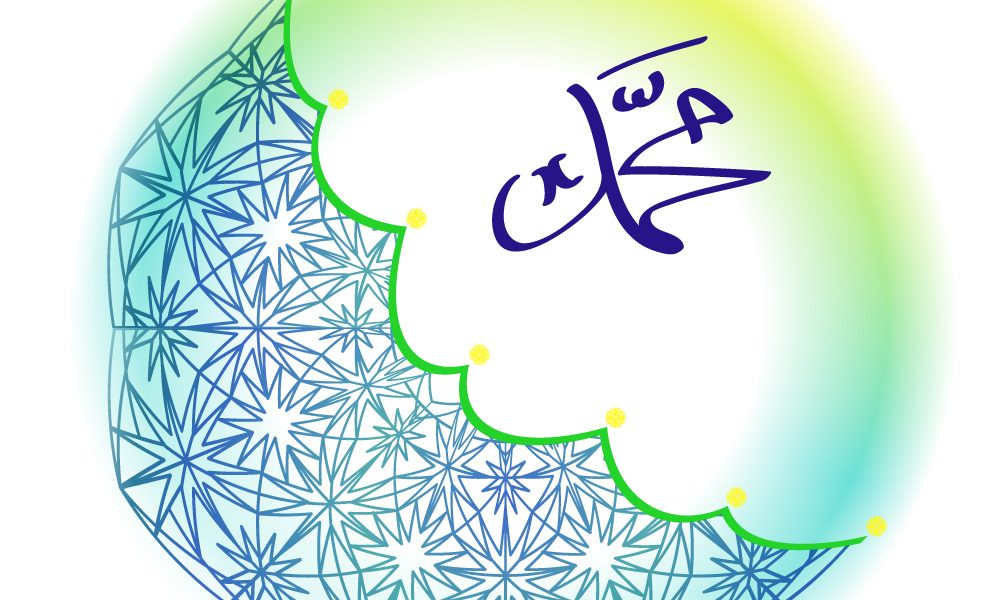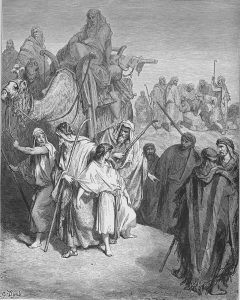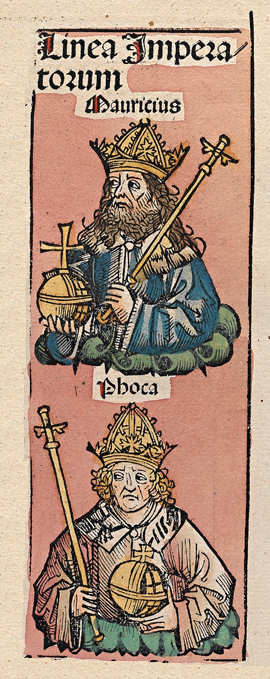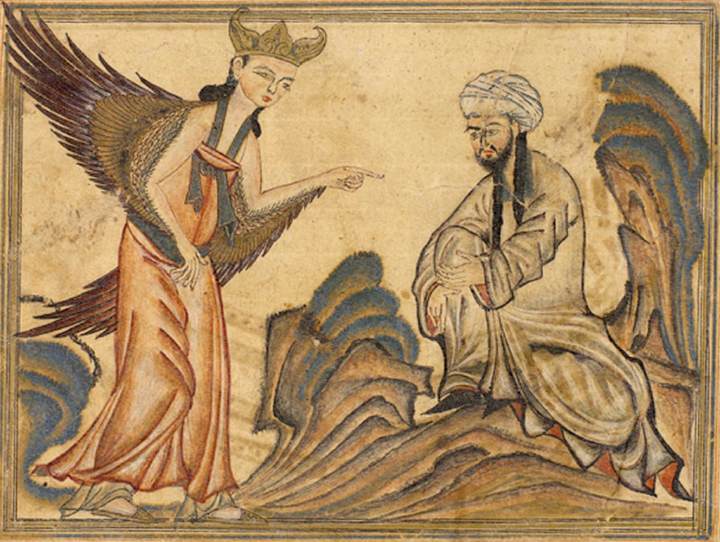
590 AD to 610 AD, Psalm 77: Muhammad.
This site was first built in French (see www.147thgeneration.net). The English translation was mainly done using « google translation ». We have tried to correct the result of this translation to avoid interpretation errors. However, it is likely that there are unsatisfactory translations, do not hesitate to communicate them to us for correction.
(for that click on this paragraph)
Summary
This generation is from the years 590 AD to 610 AD.
According to our count, this generation is the 77th generation associated with Psalm 77. It is in this Psalm 77 that we therefore find an illustration of the facts of this generation.
On the Byzantine side, Phocas, a centurion, takes power. This accession coincides with a new offensive by the Persians who almost camped at the gates of Constantinople.
This difficult situation did not prevent Phocas from attacking the Jews, including those of the border territories to Persia. In the eastern provinces it was chaos. Christians and Jews threw themselves now everywhere in each other’s throats, the latter allying themselves openly to the Persians who received them with open arms.
For the Jews, religious life in the East did not stop. In Babylonia, In Babylonia, the Gaonim succeed the Amoraim and the Saboraim. The main work of the Gaonim is to interpret the Talmudic rules, to unify the usages, to make them the source of a jurisprudence. In addition, the « responsa » allow the dispersed communities to keep in touch with each other and stay united.
This generation marks the beginning of Islam in particular by the first converts who are Khadija, the first wife of Muhammad and Ali his nephew.
The coexistence between Muslims and Jews will not be easy and will reserve many difficulties to the Jewish people. But globally the appearance of Islam will serve as a counterbalance to the immense power of the Christian world and allow Jews to survive through generations by navigating between these two worlds.
Although the contribution of Islam is a step forward for monotheism in the world, Muslims will consider their religion as the only truth and will seek to rally the Jews (among others) to their cause. This was true especially during the lifetime of Muhammad, however most Jews remained faithful to their religion regardless of the price to pay.
One of the courted Jews argues his refusal to convert by interpreting the sequence a-l-m (ʾalif lām mīm) which initializes certain suras. By following his interpretation, it gives a certain importance to generation 147 …
Talk
Phocas
On the side of Byzantium, this generation is that of the emperors Maurice (582-602) and Phocas (602-610).
On the Persian side, it is Khosro II Parviz (590-628) who succeeds to Hormozd IV. This sharing of the world is obviously being turned upside down by the emergence of Islam in the Arabian Peninsula through Muhammad.
Maurice [1] was a good emperor for Byzantium but, because of the mismanagement of his predecessor imposed a fiscal discipline that alienated the military and allowed the rise of Phocas, a centurion. He succeeded in seizing power in 602, executing Maurice and his sons.
This accession coincides with a new Persian offensive in 603. This offensive allows the Persians in four years to conquer many Byzantine territories and camp almost at the gates of Constantinople. At the same time Slavs and Avars continue to invade the Balkan Peninsula.
This difficult situation did not prevent Phocas from attacking the Jews:
- In point [2] where the crisis was, Phocas should have encouraged impulses of solidarity. But he decided to carry out a campaign of forced conversion of the Jews. Most of the victims he had in view lived in the eastern provinces – on the front line, facing the Persian attack; to alienate them at such a moment was an act of madness that was hardly credible. The Jews of Antioch rebelled and began to massacre the local Christians, inflicting a particularly cruel death on the patriarch Anastasius. Thousands of terrified people, Christians and Jews mingled, fled the slaughter and sought refuge in the Persian territory. As the empire sank into anarchy, plots succeeded each other at a rapid pace. Among the innumerable executions, there was that of the ex-Empress Constantina and her three daughters. In the capital, the Greens (with the Blues: the two ancestral rival factions of Constantinople), revolted and set fire to several public buildings; in the eastern provinces it was chaos. Christians and Jews threw themselves now everywhere in each other’s throats, the latter allying themselves openly to the Persians who received them with open arms.
This situation, which is worsening once more for the Jews, is the beginning of the psalm of this generation:

- For the conductor on jeduthun, a song of Asaph.
- My voice is to God, and I shall cry out; my voice is to God, and hearken to me.
- On the day of my distress, I sought the Lord; my wound oozes at night and does not abate; my soul refuses to be comforted.
- I remember God and I stir; I speak and my spirit becomes faint, forever.
- You held fast the awakenings of my eyes; I throb and I do not speak.
- I think of days of yore, ancient years.
- I recall my music at night; I speak with my heart and my spirit searches.
- « Will the Lord forsake [me] forever and nevermore be appeased?
- Has His kindness ended forever? Has He issued a decree for all generations?
- Has God forgotten to be gracious? Has He, in anger, shut off His mercy forever? »
Taken between the Christian empire of Byzantium and the Persian empire, the Jews at first, following the attacks of Byzantium, thought they could take the side of the Persians. The sequence of events, the taking of Jerusalem in 614 and the turn of the Persians in favor of Christians will make them disillusioned. In the current state of the world, it is hard to believe in better days. Since the Jews have come into the night, the hope that God will come to their aid is being stolen from generation to generation. The setbacks, once again in this one, unless there is a significant change in geopolitics, seem to leave little hope for the survival of the Jews as a nation in future generations. It is perhaps this change in motion (the birth of Islam) that the author of the Psalm evokes in this last verse: « Has He, in anger, shut off His mercy forever? ».
Gaonim
Religious life [3] in the East did not stop. In Babylonia, to the seven generations of the Amoraim (225-500: who deepen the Oral Law, the Mishnah) have succeeded the Saboraim (500-591: those who reason, give opinions). Now appear the Gaonim. For four centuries (589-1038), the directors of Talmudic schools are called Gaon. Undisputed leaders of religious life, the Jews of East and West respect their authority.
The main work of the Gaonim is to interpret the Talmudic rules, to unify the usages, to make them the source of a jurisprudence. In addition, the « responsa » allow the dispersed communities to keep in touch with each other and stay united.
In spite of the adversity, the ever renewed confidence of the Jewish people, drawing on the divine heritage to strengthen themselves and resist, is evoked in the following verses of the psalm:

- And I said, « This is to terrify me, the change of the right hand of the Most High. »
- I recall the deeds of Yah when I remember Your wonder from time immemorial.
- And I meditate over all Your works, and I speak of Your deeds.
Islam
In fact, this generation sees the birth of Islam.
The coexistence between Muslims and Jews will not be easy and will reserve many difficulties to the Jewish people. But globally the appearance of Islam will serve as a counterbalance to the immense power of the Christian world and allow Jews to survive through generations by navigating between these two worlds.
The Muslim tradition is indeed the « revelation » at the end of this generation.
- When[14] Muhammad had completed his fortieth year (about 610), God sent Gabriel to him, to bring him a vision. According to another version, Mohammed was then forty-three years old. Mohammed ben-Djarir mentions a tradition after which the prophet received the vision at the age of twenty. But this is not correct; for Muhammad said that no prophet received his mission before the age of forty. Because it is only at this age that reason and intelligence fully develop.
Joseph
After the advent of Christianity supposed to be associated with the descendants of Esau, this generation sees the birth of Islam associated with the descendants of Ishmael. This descendants (the Ishmaelites who agree to take Joseph out of the cistern and buy him) had already made it possible to avoid Joseph’s death and thus by allowing through exile in Egypt to make Jacob’s descendants the people of ‘Israel:
- And[15] they (Joseph’s brothers) saw him from afar, and when he had not yet drawn near to them, they plotted against him to put him to death.
- So they said one to the other, « Behold, that dreamer is coming.
- So now, let us kill him, and we will cast him into one of the pits, and we will say, ‘A wild beast devoured him,’ and we will see what will become of his dreams. »
- But Reuben heard, and he saved him from their hand[s], and he said, « Let us not deal him a deadly blow. »
- And Reuben said to them, « Do not shed blood! Cast him into this pit, which is in the desert, but do not lay a hand upon him, » in order to save him from their hand[s], to return him to his father.
- Now it came to pass when Joseph came to his brothers, that they stripped Joseph of his shirt, of the fine woolen coat which was upon him.
- And they took him and cast him into the pit; now the pit was empty there was no water in it.
- And they sat down to eat a meal, and they lifted their eyes and saw, and behold, a caravan of Ishmaelites was coming from Gilead, and their camels were carrying spices, balm, and lotus, going to take [it] down to Egypt.
- And Judah said to his brothers, « What is the gain if we slay our brother and cover up his blood?
- Come, let us sell him to the Ishmaelites, but our hand shall not be upon him, for he is our brother, our flesh. » And his brothers hearkened.
- Then Midianite men, merchants, passed by, and they pulled and lifted Joseph from the pit, and they sold Joseph to the Ishmaelites for twenty silver [pieces], and they brought Joseph to Egypt.
The story of Joseph is the subject of a surah in the Qur’an which recounts the biblical account concerning him:
- That [4] is how your Lord will choose you, and teach you the interpretation of dreams,1 and complete His blessing upon you and upon the house of Jacob, just as He completed it earlier for your fathers, Abraham and Isaac. Your Lord is indeed all-knowing, all-wise.’
- In Joseph and his brothers there are certainly signs for the seekers.
- When they (Brothers of Joseph) said, ‘Surely Joseph and his brother (Benjamin) are dearer to our father than [the rest of] us, though we are a hardy group. Our father is indeed in manifest error.’
- ‘Kill Joseph or cast him away into some [distant] land, so that your father’s love may be exclusively yours, and that you may become a righteous lot after that.’
- One of them said, ‘Do not kill Joseph, but throw him into the recess of some well so that some caravan may pick him up, if you are to do [anything].’

The project realized, the story recalls the episode of the caravan:
- And [5] there came a caravan, and they sent their water-drawer, who let down his bucket. ‘Good news!’ he said. ‘This is a young boy!’ So they hid him as [a piece of] merchandise, and Allah knew best what they were doing.
- And they sold him for a cheap price, a few dirhams, for they set small store by him.
The continuation of Surah announces the universality of monotheism:
- I (Joseph) [6] follow the creed of my fathers, Abraham, Isaac and Jacob. It is not for us to ascribe any partner to Allah. That is by virtue of Allah’s grace upon us and upon all mankind, but most people do not give thanks.
This universality adopted for the Muslim world is also the subject of the prologue of this surah:
- Alif [7], Lām, Rā. (three letters of the Arabic alphabet) These are the signs of the Manifest Book.
- Indeed We have sent it down as an Arabic Qurʾān so that you may apply reason.
- We will recount to you the best of narratives in what We have revealed to you of this Qurʾān, and indeed prior to it you were among those who are unaware [of it].
This advent of Islam is the subject of the following verses of the psalm:

- O God, Your way is in sanctity. Who is a power as great as God?
- This recognition is at the heart of Islam
- You are the God Who works wonders; You made known Your might among the peoples.
- After extending to the Western world via Christianity, monotheism seduces the nations of the East via Islam.
- You redeemed Your people with Your arm, the sons of Jacob and Joseph forever.
- The recall of the biblical characters Jacob and Joseph is, as we have just seen, very timely in relation to the outbreak of Islam.
Islam is a preponderant part of the omnipotence of God and his works.
Many times in the Qur’an, this is recalled especially in Surah 17 associated with the Night Journey of Muhammad. This recalls the election of the people of Israel consecrated on leaving Egypt:
- Certainly [8],We gave Moses nine manifest signs. So ask the Children of Israel. When he came to them, Pharaoh said to him, ‘O Moses, indeed I think you are bewitched.’
- He said, ‘You certainly know that no one has sent these [signs] except the Lord of the heavens and the earth as eye-openers, and I, O Pharaoh, indeed think you are doomed.’
- He desired to exterminate them from the land, so We drowned him and all those who were with him.
- After him We said to the Children of Israel, ‘Take up residence in the land, and when the occasion of the other [promise] comes, We shall gather you in mixed company.
- Or ‘when the promise of the Hereafter comes.’
- Or ‘We shall bring you all together.’ Or ‘We shall bring you from all places.’
This Surah also recognizes the special character of David’s psalms:
- Your [9] Lord knows best whoever is in the heavens and the earth. Certainly We gave some prophets an advantage over others, and We gave David the Psalms.
This confirmed in another Surah, with a formulation that suggests that the Psalms of David contain secrets to discover:
- [It is] a blessed Book [10] that We have sent down to you (David), so that they may contemplate its signs, and that those who possess intellect may take admonition.
Thus the psalm of David of this generation concludes with the coming out of Egypt, the founding element of the people of Israel, and recognized by the new monotheistic religion, which confirms that whatever events occur to the people of Israel, benevolence Divine to his people remains valid:

- The waters perceived You, O God, the waters perceived You, they trembled, even the deeps quaked.
- They poured forth thick waters; the skies let out a voice, even your arrows went abroad.
- The sound of Your thunder is like a wheel; the lightning illuminated the world; the earth shook and quaked.
- In the sea was Your way, and Your path in the mighty waters, and Your steps were not known.
- You led Your people like sheep by the hand of Moses and Aaron.
This generation marks the beginning of Islam in particular by the first converts who are Khadija, the first wife of Muhammad and Ali his nephew.
a-l-m (ʾalif lām mīm)
Although the contribution of Islam is a step forward for monotheism in the world, Muslims will consider their religion as the only truth and will seek to rally the Jews (among others) to their cause. This was true especially during the lifetime of Muhammad, however most Jews remained faithful to their religion regardless of the price to pay. Thus among those who accepted the controversy with Muhammad:
- There were [11], among Jewish rabbis and infidels who were fatigued with embarrassing questions to confuse the true with the false, men specially targeted in the Koran. Among them is Abu Yasir b. ‘Akhtab, who passed a day by the Messenger of Allah (Muhammad) while reciting the first verse of the Surah of the Cow (al-Baqarah): « A.L.M. this Scripture, no doubt about it ». He went to his brother Huyayy b.’Akhtab, who was with Jews, and said to them, « Know that I have just heard Muhammad recite from what has come down on him – (the sentence): A.L.M. this Scripture … «
It is difficult for anyone to base a forecast in the distant future, so Huyayy has interpreted this grouping of letters in number of years, so that the associated event is more palpable.
Recall that this grouping of letters (a-l-m (ʾalif lām mīm)) is at the top of sura 2 (The Cow – AL-BAQARAH ( البقرة ) ), the most important of the suras (at least by size) also appears at the head of other important suras of Quran (suras 3, 7, 29, 30, 31, 32 and also 13).

The count performed by Huyayy is made from the numerical value associated with each letter of the Hebrew alphabet corresponding to those of the Arabic alphabet (the two alphabets are very close). If instead of counting in years, we count in generations, as we have already done for an equivalent count in the Gospels (see psalm of generation 48 which marks the birth of Christianity), the duration of Islam would be as well seventy-one generations. Either from the present generation (77) to the one hundred and forty-seven generation which on the one hand is the last of the night of the people of Israel and also is the last generation of Christianity, as we concluded in the commentary of the Psalm forty-eight.
According to some commentators, this abbreviation A.L.M. would have been borrowed from Judaism:
- It took [12] to wait for the specialist of Judaism Kurt Hruby, Professor at the Catholic Institute of Paris, to discover that the abbreviation ‘ALM is used in rabbinic literature (there is also a whole system) it is the abbreviation for ‘El Le-Môṧâ’ot,’ meanings God of Victories ‘(or salutations – rac .: ṧw’).

[1] According to John Julius Norwich: « History of Byzantium », Chapter: « The First Centuries » (French: « Histoire de Byzance », Chapitre : « Les premiers siècles » (p. 108 à 110) )
[2] John Julius Norwich: « History of Byzantium », Chapter: « The First Centuries » (French: « Histoire de Byzance », Chapitre : « Les premiers siècles » (p. 111) )
[3] According to Marianne Picard: « Jews and Judaism / from 70 to 1492 – Volume 2 » (French: « Juifs et Judaïsme/ de 70 à 1492 – Tome 2 » (p.68 à 74) ).
[4] The Koran, Surah 12 (Joseph, « Yūsuf » ( يوسف ) ), verses 6 to 10
[5] The Koran, Surah 12 (Joseph, « Yūsuf » ( يوسف ) ), verses 19 and 20
[6] The Koran, Surah 12 (Joseph, « Yūsuf » ( يوسف ) ), verse 38
[7] The Koran, Surah 12 (Joseph, « Yūsuf » ( يوسف ) ), verses 1 to 3
[8] The Koran, Surah 17 (The Night Journey, »al-Isrā » ( الإسراء ),The surah is also known as: Glory, The Children of Israel ), verses 101 to 104.
[9] The Koran, Surah 17 (The Night Journey, »al-Isrā » ( الإسراء ),The surah is also known as: Glory, The Children of Israel ), verse 55.
[10] The Koran, Surah 38 : (Ṣād, « Ṣād » ( ص ), the name of the letter that initializes surah), verse 29
[11] Ibn ‘Ishâq: « Muhammad » (French translation of’ Abdurrahmân Badawî) – Volume 1 – Chapter: « Jews are joined by ‘Ansar hypocrites / Hypocrites are humiliated and driven out of the mosque’ (French: Ibn ‘Ishâq : « Muhammad » (traduction de ‘Abdurrahmân Badawî) – Tome 1 – Chapitre : « Les juifs sont rejoints par des ‘Ansârs hypocrites/Les hypocrites sont humiliés et chassé de la Mosquée » (p. 450) )
[12] Edouard-Marie Gallez: « The Messiah and his Prophet, to the origins of Islam – Volume II: From the Muhammad of the Caliphs to the Muhammad of history ». (French: « Le Messie et son prophète, aux origines de l’Islam – Tome II : Du Muhammad des Califes au Muhammad de l’histoire ». (p. 49) ).
[14] Tabari: « History of the prophets and kings: Mohammed, seal of the prophets » / Chapter: « Mission of Mohammed »)
[15] Bereishit – Genesis – Chapter 37, verses 18 to 28



